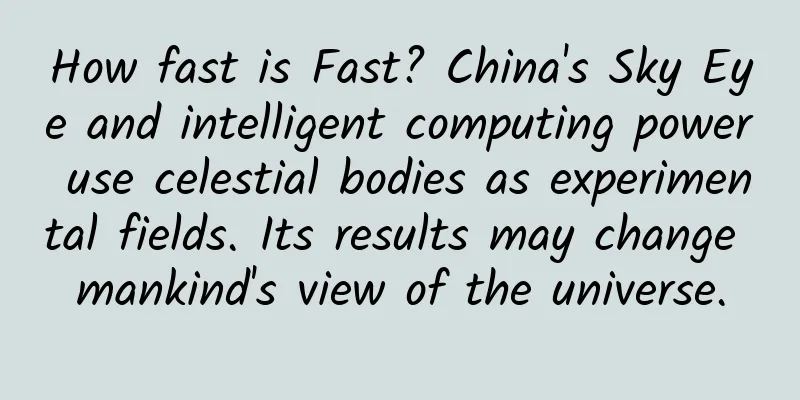How fast is Fast? China's Sky Eye and intelligent computing power use celestial bodies as experimental fields. Its results may change mankind's view of the universe.

|
· Publisher of this issue: Feng Yi, research expert at the Intelligent Computing Platform Research Center of Zhijiang Laboratory · Content of this issue: FAST carefully depicts active repeating fast radio bursts (Top Ten Advances in Chinese Science in 2022) There are mountains upon mountains and green forests like the sea. Between the mountains in Guizhou, my country, there stands a majestic spherical radio telescope. It looks up at the starry sky and searches for radio signals from light years away, carrying human curiosity and expectation about the universe. It is FAST, which we usually call "China's Sky Eye". As the world's largest single-aperture and most sensitive radio telescope, FAST can search for weak signals from billions of light years away in the radio band. Recently, the Zhejiang Provincial Science and Technology Association's "Popular Science Release of Scientific and Technological Achievements" event once again came to the Zhijiang Laboratory. This time, the results brought by Feng Yi, a research expert from the Intelligent Computing Platform Research Center of the Zhijiang Laboratory, came from the data captured by FAST. Unveiling the mystery of fast radio bursts What is a fast radio burst? At the beginning of the event, Feng Yi introduced this uncommon astronomical term to everyone. "As the name implies, 'rapid' means that it lasts very, very shortly, only about one thousandth of a second, 200 times faster than a human blink; 'radio' means that it has only been observed in the radio band, and 'burst' means an explosion, which has very high energy. The energy released each time may be higher than the energy released by the sun in a year, which can probably be used by humans for one trillion years." In 2007, fast radio bursts (FRBs) were detected by humans for the first time, and quickly became the focus of attention of astronomers around the world. They can be said to be a "net celebrity" in the field of astronomy. This kind of extreme explosion can only occur in the universe, and studying its generation mechanism may have a revolutionary impact on physics and astronomy. In Feng Yi's words, "This is the universe helping humans create a natural experimental site." The origin and evolution of fast radio bursts remain a mystery. In the astronomical community, there are about 50 theories about the origin of fast radio bursts - a number that was once greater than the number of fast radio bursts observed by humans. Until 2019, China's Sky Eye FAST discovered the world's first sustained active repeating burst "20190520B". "Fast radio bursts are generally named after the time when they first appeared in human observation equipment." This fast radio burst captured on such a romantic day as 520 is like a gift from the universe to astronomers. Feng Yi jokingly called it the "King of Rolls" among fast radio bursts. Because generally there is a rest period after the outbreak of radio bursts, and since the appearance of "20190520B", one or more telescopes have detected its bursts every time it is monitored, which means that it is the world's first "sustained active fast radio burst". When astronomy meets intelligent computing FAST continuously surveys the vast universe, generating up to 300 TB of data every day, which can fill up 300 personal computers. Faced with this vast amount of data, how can we obtain effective information from it? Feng Yi’s answer is “computing power + astronomy”. In 2021, the Zhejiang Laboratory and the National Astronomical Observatory jointly created the FAST-based astronomical intelligent computing platform FAST@ZJLAB. Thanks to intelligent computing and artificial intelligence technologies, data that used to take ten days to complete now only takes less than a day. Through computational analysis of fast radio burst polarization, Feng Yi proposed for the first time a unified mechanism for the evolution of the polarization frequency of repeating bursts, namely, the repeating burst signal will undergo multi-path scattering by the complex plasma around it, which can be described by a single parameter "RM dispersion". This important discovery of Feng Yi, along with two other research results on fast radio bursts in which he was deeply involved, was selected as one of the "Top Ten Advances in Chinese Science in 2022". This series of blockbuster results may not be able to directly verify a certain theoretical model of origin, but they provide key evidence for revealing the origin of fast radio bursts and will play an important role in building a complete puzzle about fast radio bursts in the future. At the end of the event, Feng Yi also quoted a sentence from "The Three-Body Problem", "The whole universe will twinkle for you". Although this sentence is about the cosmic microwave background radiation, it is also applicable to fast radio bursts. The vast universe, the stars are twinkling, and wonderful changes are happening every moment, which will also produce countless new scientific research results. What new discoveries will there be in the future? In Feng Yi's view, this is something to look forward to. "The research we conduct through FAST data may change mankind's view of the universe in the future." Weng Danni, reporter of Metropolis Express and Orange-Persimmon Interactive |
>>: The Astronomical Mystery of "Five Stars Rising from the East Bring Good Luck to China"
Recommend
From the fog, look at the weather
Produced by: Science Popularization China Author:...
How to plan a lucky draw for the annual meeting? Share 1 set of theoretical formulas!
Attention, we are about to enter the "lotter...
Hundreds of "smart volunteers" are on duty! Humanoid robots have become the "leaders" of conference affairs?
The 2025 Zhongguancun Forum Annual Meeting offici...
Sleep vs. Health——To the Working People!
One third of a person's life is spent sleepin...
Because of its delicate nature and "seeking death", it has turned itself into the "giant panda of the plant world"
You must have heard of giant panda blood - Rh neg...
Changsha tea tasting, Hi Select Club, where is the most reliable place to drink tea
Recommended 185-6916-1745 Wei QQ synchronization,...
There will be no New Year's Eve this year! In the next five years, "30" will be absent for consecutive years →
Today (January 17), the 2022 Spring Festival trav...
Kaikeba Data Analysis High Salary Training Program Elite Class-030
Kaikeba Data Analysis High-salary Training Progra...
The best article I've ever read about user operations: the definition, evolution and methodology of user operations
How to do user operations? What are some good met...
"Commercial Office∞|Haozu Xiaolou Product Upgrade Conference" was successfully held in Beijing
On November 18, Haozuo, a full value chain commer...
Apple can’t escape the law of true fragrance: iOS 16 will be embedded with a large number of advertisements, will you buy it?
I once saw someone say in a forum: The only reaso...
Unveiling the secrets of karst carbon sinks: the never-ending “carbon capture expert”
The global karst distribution area is 22 million ...
Congratulations to Chinese scientists! New breakthroughs in 2023
A century of change Technological innovation is t...
7 predictions about live streaming
Live streaming is a stopover on the journey from ...
The ancient tomb has been underground for thousands of years. Will the mechanism inside rust? The ancients thought of this long ago.
Previously, film, television and novel works abou...









